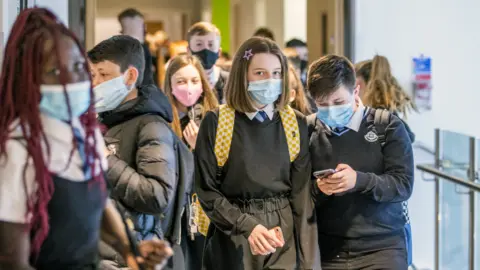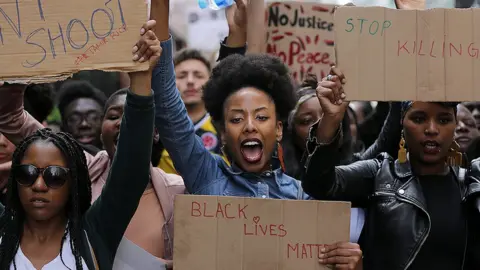OED Word of the Year expanded for 'unprecedented' 2020
 PA Media
PA MediaThis year has seen so many seismic events that Oxford Dictionaries has expanded its word of the year to encompass several "Words of an Unprecedented Year".
Its words are chosen to reflect 2020's "ethos, mood, or preoccupations".
They include bushfires, Covid-19, WFH, lockdown, circuit-breaker, support bubbles, keyworkers, furlough, Black Lives Matter and moonshot.
Use of the word pandemic has increased by more than 57,000% this year.
Casper Grathwohl, the president of Oxford Dictionaries, said: "I've never witnessed a year in language like the one we've just had. The Oxford team was identifying hundreds of significant new words and usages as the year unfolded, dozens of which would have been a slam dunk for Word of the Year at any other time.
"It's both unprecedented and a little ironic - in a year that left us speechless, 2020 has been filled with new words unlike any other."

How news impacts language

All languages evolve, but the rate of evolution has sped up today.
In this, the Too Much Information Age, when media is all pervasive, new words and usages adapt at an ever faster rate.
It's inevitable that the pandemic should have rescued old words (coronavirus), super-charged some that were loitering in our culture (furlough), and - in the case of Covid - created a neologism.
What's more striking to me is how the news cycle generates new phrases and usages.
Black Lives Matter - BLM - was in usage before George Floyd was killed; but today it has penetrated our public domain as never before. So too mail-in and conspiracy theory - not because the conspiracy theories about mail-in ballots are new or true, but rather because they are espoused by the most famous person in the world, in Donald J Trump.
Yet the news cycle is a fickle friend, and sometimes not even a friend. That usage of Brexit should be down by 80% even as we enter its most critical phase shows that, sadly, the limited bandwidth of news programmes and human attention can harm priorities.
Isn't now exactly the moment when we should be using Brexit more than ever?

Oxford University Press said it used "evidence-based data" to explore this year's language developments.
"We saw new words emerge, and historical words resurface with new significance, as the English language developed rapidly to keep pace with the political upheaval and societal tensions that defined the year," they added.
They divided their findings into specific areas:
The language of Covid-19
 Drew Allan
Drew AllanThe report said the word coronavirus dates back to the 60s and was previously "mainly used by scientific and medical specialists".
But by April this year it had become "one of the most frequently used nouns in the English language, exceeding even the usage of the word time. By May, it had been surpassed by Covid-19.
It stated that the arrival of the pandemic saw "huge increases" from March in the use of circuit breaker, lockdown, and shelter-in-place, along with support bubbles or pods, face masks, PPE, medics, delivery drivers, and supermarket staff key workers, frontliners, or essential workers.
The report also stated that phrases including mask up, anti-mask, anti-masker and mask-shaming were "among the proliferation of words reflecting attitudes towards the issue of mask-wearing". Superspreader is a word dating back to the 70s, the report said, but it spiked in October when coronavirus cases spread in the White House.
The word reopening also increased in frequency as summer approached, relating to the number of shopping outlets that were closed during lockdown, while moonshot came into use, as the name of the UK government's programme for mass Covid testing.
Technology and remote working
 Zoom
ZoomTwo words that have seen a growth of more than 300% since March are remote and remotely. As for Zoom meetings, it will come as no surprise that the words mute and unmute have had a "significant rise in usage this year".
Other words getting a lot more use include workcation (up 500%) - a holiday in which you also work - and staycation (up 380%) - a holiday at home or in your home country. Both words have seen increase in usage, almost 500% and 380% respectively.
Social movements, social media and politics
 Getty Images
Getty ImagesThis year also saw an increase in activism and demonstrations, despite social distancing being in place. Usage of Black Lives Matter and BLM surged following the death of George Floyd in the US.
The report also said use of conspiracy theory has "almost doubled between October 2019 and October 2020" and use of the term QAnon increased 960% during that time.
It added that the words impeachment and acquittal, relating to US President Donald Trump, were more prevalent at the early part of the year, whereas more recently, words such as mail-in, relating to US voting, were up 3,000% compared with 2019.
Meanwhile the word Brexit was used 80% less this year, but usage was up for the phrase cancel culture - the withdrawing of support from public figures whose words and actions were considered socially unacceptable.
The environment
 Getty Images
Getty ImagesThe report said that levels of media coverage for climate change have fallen this year due to the pandemic. But it said that the result was a new word being used - anthropause, referring to "the global slowdown of travel and other human activity and the subsequent welcome consequences, such as a decrease in light and noise pollution".

Follow us on Facebook, or on Twitter @BBCNewsEnts. If you have a story suggestion email [email protected].
